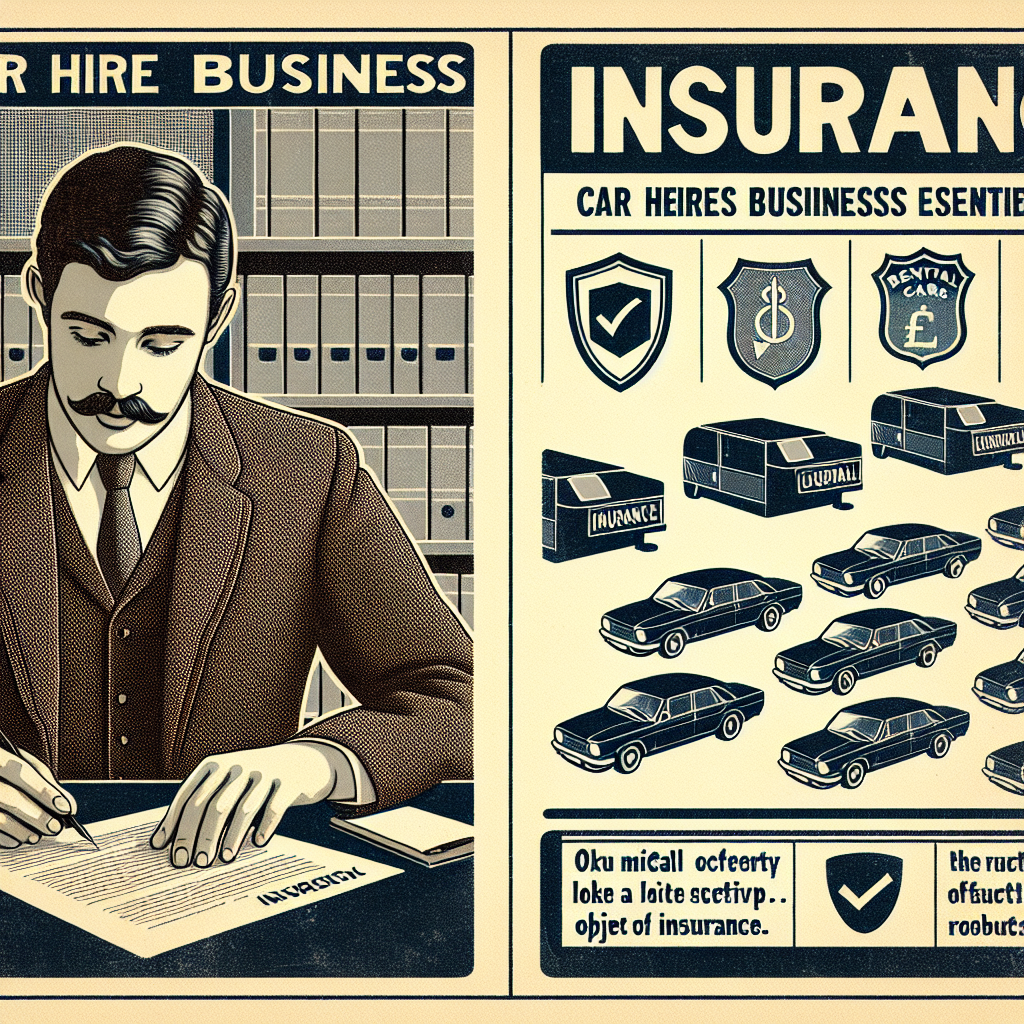Filed under Business Insurance on
Understanding Car Hire Business Insurance Essentials

In the fast-paced world of car hire businesses, ensuring that every vehicle is protected by adequate insurance is not just prudent—it's essential. Navigating the intricacies of car hire business insurance can be daunting, especially for newcomers to the industry. From liability coverage to fleet protection, understanding the diverse aspects of insurance can make the difference between a thriving enterprise and one bogged down by unforeseen liabilities.
Why Car Hire Business Insurance is Crucial
Car hire businesses operate in a unique niche, juggling multiple vehicles, drivers, and routes daily. This complexity brings risks such as vehicle damage, theft, and third-party liabilities. Car hire business insurance acts as a safety net, mitigating financial loss and enabling operators to manage risks effectively.
Without proper insurance, any incident involving a customer or vehicle can be financially devastating. Accidents, whether minor or major, have the potential to incur significant repair costs and legal liabilities. Insurance provides peace of mind, ensuring that businesses can focus on providing excellent service rather than worrying about potential financial setbacks.
Key Components of Car Hire Business Insurance
Understanding the core components of car hire business insurance helps operators choose the right policy for their needs. Here's a closer look at the essential elements every car hire insurance policy should include:
1. Liability Insurance
At the forefront of any car hire business insurance is liability coverage. This insurance protects your business from claims arising from accidents that cause bodily injury or property damage to third parties. In many regions, holding a minimum level of liability insurance is a legal requirement. It covers potential claims for medical expenses, legal fees, and property repairs, ensuring that one incident doesn't derail your business operations.
2. Physical Damage Coverage
Physical damage coverage is an integral part of car hire business insurance that safeguards against damages to vehicles within the fleet. Typically, this coverage is divided into two types:
- Collision Coverage: This covers damages to your vehicles resulting from collisions, regardless of who is at fault.
- Comprehensive Coverage: Protects against non-collision incidents such as theft, vandalism, natural disasters, or animal-related damages.
3. Uninsured/Underinsured Motorist Coverage
This component offers protection when an accident involves a driver who has insufficient insurance to cover the damages. Uninsured/underinsured motorist coverage is crucial in offering compensation for injuries and damage sustained in such scenarios, safeguarding your business from additional financial stress.
4. Personal Accident Insurance
Personal accident insurance provides financial protection to drivers in the event of bodily injuries sustained during vehicle hire operations. This coverage is crucial for ensuring the safety and welfare of your workforce, covering expenses such as medical costs and lost wages.
5. Crime and Theft Insurance
Car hire businesses are susceptible to theft and fraudulent activities. Crime and theft insurance covers against vehicle theft and financial losses resulting from employees’ dishonest acts, ensuring that your business' assets are secured.
Choosing the Right Insurance for Your Car Hire Business
Identifying the right insurance policy requires careful consideration of several factors:
1. Evaluate Your Fleet Size
The size of your vehicle fleet significantly influences the type and extent of insurance coverage required. Larger fleets often benefit from umbrella policies that cover a range of risks across all vehicles.
2. Analyze Business Operations
Understanding your business’s operational scope, including the primary types of customers served and average rental durations, helps tailor your insurance needs. High-frequency rentals to multiple customers may require more comprehensive coverage due to increased risk exposure.
3. Review Legal Requirements
Insurance legalities differ across regions. Ensure compliance with local regulations to avoid penalties. Consulting a legal expert or an insurance advisor can help in understanding regional requirements and in designing the most suitable policy for your business.
4. Consider Industry-Specific Risks
Every industry faces unique risks. For car hire businesses, frequent vehicle exchanges, diverse driving patterns, and varying customer profiles create particular vulnerabilities that must be addressed with appropriate insurance solutions.
Expert Tips for Managing Car Hire Business Insurance
Mitigating risks and prolonging your business's sustainability involves strategic management of your insurance policies. Here are expert-endorsed tips:
1. Regularly Review and Update Policies
As your business evolves, so does its insurance necessity. Regular assessment of existing policies ensures they stay aligned with current operational needs and industry changes. Engaging with an insurance specialist annually can reveal coverage gaps and opportunities for better protection.
2. Educate Your Team
Ensuring that your employees understand the basics of your business insurance helps in maintaining compliance and reducing risks. Regular training sessions ensure everyone knows what to do in the event of an incident.
3. Maintain Accurate Records
Accurate and up-to-date records of all vehicle transactions and incidents facilitate smoother claims processes. Digital record-keeping systems can streamline this task, ensuring that data is secure yet accessible.
Industry Trends Impacting Car Hire Business Insurance
The car hire industry constantly evolves, and so do its associated insurance needs. Staying abreast of trends ensures that your business remains adequately protected:
1. Technological Advancements
With the increase in telematics and GPS technology, insurers can better assess risk profiles, offering tailored policies that accommodate tech-savvy car hire businesses. These technologies also help businesses monitor vehicle usage and customer behavior, providing valuable data for risk management.
2. Rise of Electric Vehicles
As environmental sustainability gains prominence, electric vehicles (EVs) are increasingly integrated into hire fleets. Insurance policies are adapting to incorporate risks associated with EVs, including battery replacement costs and specialized repair needs.
3. Increasing Incidences of Cyber Threats
With digital transactions being central to operations, car hire businesses face growing cyber threats. More now, insurers offer cyber liability coverage to alleviate risks related to data breaches and other cyber incidents.
Conclusion
Understanding car hire business insurance essentials is crucial for the longevity and success of any rental enterprise. By thoroughly grasping key components like liability coverage, physical damage protection, and specific operational needs, businesses can secure suitable insurance, protect against significant financial losses, and foster trust among customers. As the industry continues evolving, staying informed about emerging trends and adapting insurance strategies are critical for staying ahead and thriving in a competitive market landscape. Through continuous learning and strategic planning, car hire businesses can navigate potential pitfalls and drive their operations towards sustained prosperity.





